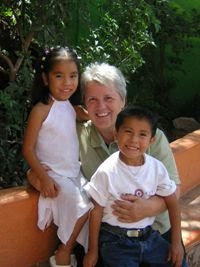 This past week I've been planning the academic service learning course for next term, Soc 205 World Cultures online. Preparation is essential for a successful service-learning course --finding out what the non-profit organization needs, planning the project that will meet those needs, and aligning the service project and course content with the learning objectives and outcomes of the course.
This past week I've been planning the academic service learning course for next term, Soc 205 World Cultures online. Preparation is essential for a successful service-learning course --finding out what the non-profit organization needs, planning the project that will meet those needs, and aligning the service project and course content with the learning objectives and outcomes of the course.The founder of Casa de los Angeles daycare center, Donna Quathamer (in photo with children), is an incredible human being, a transformational leader and she will be an active partner with our students. Our recent discussions have focused on identifying what our service learning partner needs.
While Casa de los Angeles has a website and a Facebook page, they believe that their social media strategy needs more effective 2-way communication and would like our students to help brainstorm and create a sample template for a volunteer web log, which can be linked to their website and FB page. Casa de los Angeles has had at least 1000 volunteers from all over the world work at the center, and a blog would allow them to tell their stories and stay in touch. Our service project will help Casa de los Angeles build and expand their growing virtual community.
Over the next few weeks, Donna and I will work to refine the initial goals and objectives of the service project. Second, I will be collecting materials from Casa--photos, text, stories, video, audio, calendar of events, etc.--for students to use in their service project. And, Donna is now composing a special message to our students, which I plan to videotape and post on our Blackboard course site. There is so much to do here before I leave Mexico!
One of Casa's dedicated volunteers, Marisa Bollman, has made a short documentary on Casa de los Angeles. I hope you enjoy it!
Sí, se puede from Casa de los Angeles on Vimeo.





